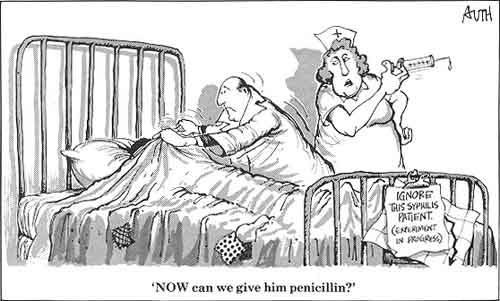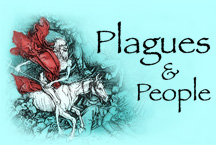| Tuskegee, Ala., July 26 [1972] -- They came around one day in 1932 and told Charles
Pollard he could get a free physical examination the next afternoon at
a nearby one-room school.
"So I went on over and they told me I had bad blood," the 66-year-old
farmer recalled today. "And that's what they've been telling me ever
since. They come around from time to time and check me over and they
say, 'Charlie, you've got bad blood.'"
Yesterday, Mr. Pollard learned that, for the last 40 years, he has had
syphilis. He is one of 74 survivors of a United States Public Health
Service experiment in which 400 black men went without treatment for the
disease and were used without their knowledge or consent in a study of
its ultimate effects.
Dr. Donald Printz of the Center for Disease Control in Atlanta said
that the Tuskegee Study, as the project has come to be known, was "almost
like genocide." He said that "a literal death sentence was cast on
some of those people."
Federal Inquiry
Today the Department of Health, Education and Welfare began a formal inquiry.
And a spokesman for Gov. George C. Wallace said Alabama officials were
attempting to determine whether state laws requiring mandatory treatment
of venereal disease had been violated.
Under those laws, Mr. Pollard should have been given treatment, at public
expense if necessary, as soon as the Public Health Service technicians
discovered at the school that he was infected with the disease.
The Federal representatives had placed him in a 200-man group of infected
subjects who would not be informed of their condition or treated for it.
A second group of 200 men, also infected, were to have received the best
treatment available, but it was disclosed today that none of the 400 men
who had syphilis was ever treated.
The third classification within the study was a 200-man group not infected.
While the study began a decade before penicillin was discovered and
about 15 years before it was widely available to physicians, the Public
Health Service maintained its no-treatment policy with its study subjects
after the drug was determined to be effective against the disease.
The program's primary research techniques were periodic examinations
and autopsies, both of which were attempts to determine what damage the
untreated disease could do to the human body. In return the subjects
were promised hospital care, free burial and $100 for their survivors.
"But I never got into that much," Mr. Pollard said today on his 66-acre
farm about three miles from Tuskegee, which is 40 miles east of Montgomery.
"I've always been able to pretty much make my own way." He was born,
he said, half a mile from the little brick and frame house where he lives
with his wife, Louiza. He inherited the land from his father, who
was the son of a slave couple.
He appeared to be in excellent health and said he had not missed a day
of working "in a long, long time." Dr. Ralph Henderson, of the Center
for Disease Control, said that Mr. Pollard was probably among the one-third
or so of those who contract syphilis in whom the organism either dies out
or becomes dormant without medical intervention.
A newcomer to the Tuskegee Study, Dr. Henderson said it was his understanding
that the term "bad blood" was simply a synonym in the black community for
syphilis.
"That could be true," Mr. Pollard said. "But I never heard no
such thing. All I knew was that they just kept saying I had the bad
blood--they never mention syphilis to me, not even once."
Mr. Pollard, who is described by his neighbors as a "fairly well-to-do
man," was dressed today in the traditional garb of farmers in this area--faded
blue overalls and a work shirt. He said he had no idea when he might
have contracted the disease. He said that his only child, a daughter,
was born in 1925.
"My wife hasn't had it -- at least not that I know of -- and I've been a clean-living
man," he said in response to an inquiry about the possible infection of
others.
Then he seemed weary of discussing the matter and climbed aboard his
tractor. "I have to go to work now," he said. "I understand
work. All of the rest of this mess I don't understand."

--Tony Auth, Philadelphia Inquirer, July 1972
|


